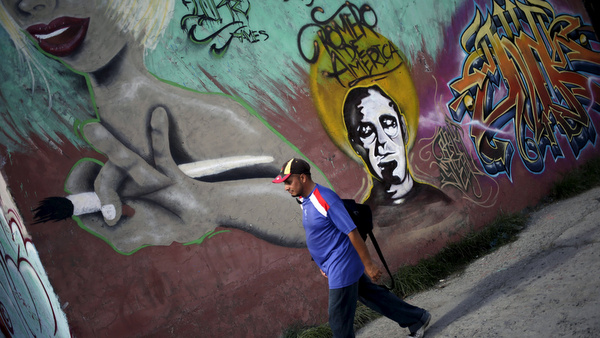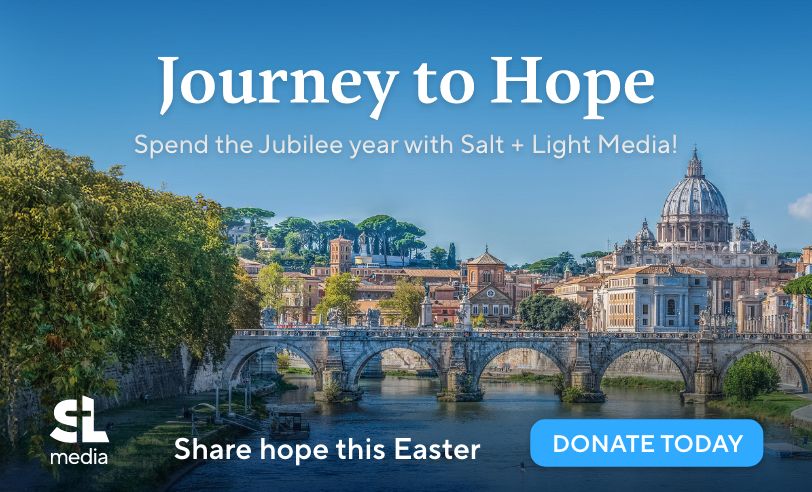 The Producer Diaries
Cheridan Sanders, a Producer at Salt and Light Television, reflects on her experiences as she travels the world telling Catholic’s stories.
The Producer Diaries
Cheridan Sanders, a Producer at Salt and Light Television, reflects on her experiences as she travels the world telling Catholic’s stories.


Don't Skip Out on Saints
Cheridan Sanders
Friday, October 2, 2015

 Up until that point, most of the saints I knew of were so far removed from my own experiences I kind of just wrote them off. But learning about Archbishop Romero was different. There was something tragically real about his life.
It’s been more than a decade since I was in high school, but I've been inspired to reconnect with his story by reading a biography about Oscar Romero published by Novalis. The book I've been reading is part of the People of God series, it’s called Love Must Win Out. It serves as a great intro (or refresher) on Oscar Romero and most importantly it tells the story of a modern day person who like us was challenged by the times he lived in to become a hero, a saint. I caught up Author, Kevin Clarke to learn more.
This book begins with a frank conversation between Oscar Romero and John Paul II. Why did you choose to start there?
Up until that point, most of the saints I knew of were so far removed from my own experiences I kind of just wrote them off. But learning about Archbishop Romero was different. There was something tragically real about his life.
It’s been more than a decade since I was in high school, but I've been inspired to reconnect with his story by reading a biography about Oscar Romero published by Novalis. The book I've been reading is part of the People of God series, it’s called Love Must Win Out. It serves as a great intro (or refresher) on Oscar Romero and most importantly it tells the story of a modern day person who like us was challenged by the times he lived in to become a hero, a saint. I caught up Author, Kevin Clarke to learn more.
This book begins with a frank conversation between Oscar Romero and John Paul II. Why did you choose to start there?
 The Producer Diaries
Cheridan Sanders, a Producer at Salt and Light Television, reflects on her experiences as she travels the world telling Catholic’s stories.
The Producer Diaries
Cheridan Sanders, a Producer at Salt and Light Television, reflects on her experiences as she travels the world telling Catholic’s stories.
Related Articles:
Category: Featured, General Posts, Saints and Blesseds, The Producer Diaries, Year of Consecrated Life
Tag: Archbishop Oscar Romero, Blessed Oscar Romero
Homily of Pope Leo XIV at the Mass for the Jubilee of Families, Children, Grandparents, and the Elderly
Sunday, June 1, 2025
 Pope Leo XIV
Pope Leo XIV
Pope Leo XIV celebrated Mass for the Jubilee of Families, Children, Grandparents, and the Elderly and referred to Pope Francis and mentioned spouses who have been beatified and canonized, like the parents of St. Therese of the Child Jesus.
Looking back on Rerum Novarum
Monday, May 26, 2025
 Matthew Neugebauer
Matthew Neugebauer
Pope Leo XIV chose his name primarily to highlight his most recent namesake Leo XIII, whose "historic encyclical Rerum Novarum addressed the social question" to the challenges of his time. What concerns does the encyclical address? How does it speak to its time? And what has been its legacy 134 years later?
Homily of Pope Leo XIV at the Mass and Installation on the Roman Cathedra
Sunday, May 25, 2025
 Pope Leo XIV
Pope Leo XIV
On May 25, 2025, Pope Leo XIV was formally installed on the cathedra of the Diocese of Rome at a Mass in St. John Lateran Basilica. In his homily, he said that "communion is built primarily 'on our knees,' through prayer and constant commitment to conversion."
St. John Lateran: The Pope’s Cathedral
Friday, May 23, 2025
 Matthew Neugebauer
Matthew Neugebauer
Did you know that the pope has his own cathedral? Pope Leo XIV is about to "take possession" of the Lateran Basilica, which you can read all about here.
Homily of Pope Leo XIV at the Inaugural Mass
Sunday, May 18, 2025
 Pope Leo XIV
Pope Leo XIV
On May 18, 2025, Pope Leo XIV inaugurated his pontificate with Holy Mass in St. Peter's Square. In his homily, he said, "I come to you as a brother, who desires to be the servant of your faith and your joy, walking with you on the path of God’s love, for he wants us all to be united in one family."
SUPPORT LABEL
$50
$100
$150
$250
OTHER AMOUNT
DONATE










